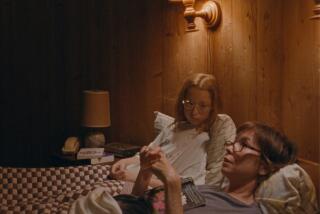TV REVIEW : Josephine Baker Gets Her Due : HBO’s ‘The Josephine Baker Story’ illuminates the life of one of the most remarkable women of the century--and makes a star of Lynn Whitfield.
Never mind that it’s a sad, ironic comment on Hollywood that, 15 years after the death of the legendary Josephine Baker at 68, no studio has made a film about her, even though her life was the stuff of half-a-dozen movies. For now, it is HBO that is presenting “The Josephine Baker Story,” premiering Saturday at 8 p.m., and the cable network has done an astonishingly comprehensive and thoroughly captivating job of illuminating the life and times of one of the most remarkable women of the 20th Century.
In the process, it signals the arrival of a vibrant new star in Lynn Whitfield, whose vivid yet subtle portrayal of the complex and mercurial Baker is the kind that wins prizes and launches important careers.
Baker did it all, and she surely did it her way. Director Brian Gibson and writer Ron Hutchinson, working from a story by Hutchinson and Michael Zagor, manage with both substance, economy and considerable accuracy to take Baker from the dire poverty of an East St. Louis ghetto, where she witnessed the terrifying 1917 race riots, into show business and on to Paris, where she became the Jazz Age rage with her uninhibited dancing and eye-crossing clowning.
A woman of formidable talent and intellect as well as dazzling presence and sexuality, Baker became a great star of France’s music halls, developing into a memorable singer, a heroine of the Resistance and a fearless fighter for civil rights in her native country, especially during her controversial 1951 tour of the United States, then in the grip of McCarthy-era paranoia.
Unable to bear children of her own, Baker and her fourth husband, French bandleader Jo Bouillon (played by a well-cast David Dukes), commenced adopting children of all races in her attempt to demonstrate at her fairy-tale chateau the natural harmony of all peoples. For once, Baker took on more than she could handle, and her noble experiment, conducted on a too-ambitious scale, undermined her marriage, her fortune and her health in that order.
Nonetheless, Baker in 1975 returned in triumph to the Paris stage and went out in blaze of glory.
Miraculously, Gibson and Hutchinson manage to include all this and more without being either superficial or unobjective. They allow Whitfield’s Baker to blossom into a woman of awe-inspiring courage and tenacity but whose will of iron could be hell on the men who loved her. They distill perfectly the moment when Baker outgrows her first mentor, her true love, a Sicilian gigolo (beautifully played by Ruben Blades) who passes himself off as a count and who guides her unerringly to stardom--until he masterminds her disastrous return to Broadway in the 1936 edition of the Ziegfeld Follies. This headstrong Baker is as human and vulnerable as anyone else.
Interestingly, as Baker ages, Whitfield resembles her more and more and captures her extraordinary impact even in her later years. Near the end of her life, Baker appeared at the Music Center, a woman whose svelte, still seductive figure contrasted with her honestly lined face, just as the gaudy Folies Bergere feathers and sequins contrasted with the gutsy, down-to-earth individual who was wearing them.
It may well be that the scale and budget of a production for the small screen worked to advantage in honoring Baker by focusing on her instead of production values. Even so, “The Josephine Baker Story” looks authentic, even if filmed entirely in Hungary, and has plenty of razzle-dazzle in its sets and costumes.
There’s only one real quibble to be had with the film: Instead of suggesting that Baker was through with America after her bitter 1951 experiences, why aren’t we told of her major participation at the 1963 civil rights march on Washington? Of that historic occasion she said, “For the first time in my life, I feel free.”
More to Read
The complete guide to home viewing
Get Screen Gab for everything about the TV shows and streaming movies everyone’s talking about.
You may occasionally receive promotional content from the Los Angeles Times.






